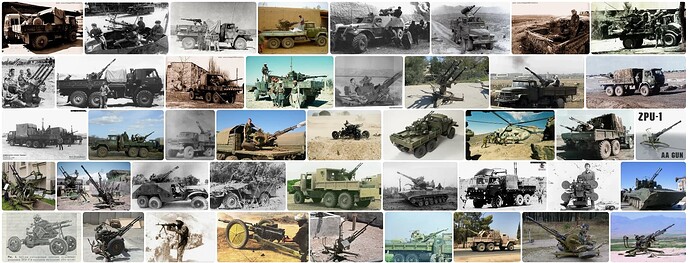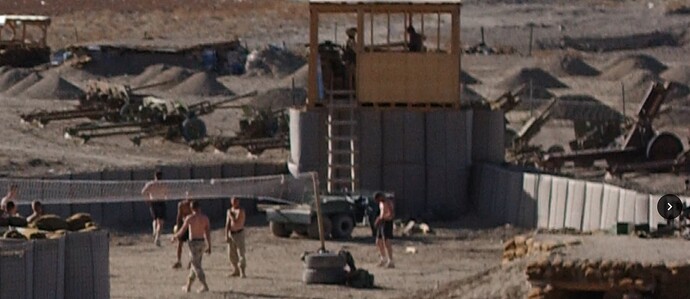I did buy the set of Meng Soviet AA guns, and would actually show varieties of them in ground position. I read that during the Afghanistan war, Soviet bases would have soldiers in ZSU-23 guns around them. I wanted to find a picture and an appropriate figure to sit in the gun. Yes, I’ve seen YouTube videos of various guns being fired, but not combat situations.
Here is a link to a very interesting photo. And here is a link to the article “Weapons of Afghan dushmans. Anti-aircraft machine gun and artillery installations” (in Russian) on a trustworthy website. And try inserting the search string in Cyrillic into Google “ЗПУ Афганистан” (“ZPU Afghanistan”).
I was thinking the Soviet Army, but that is interesting too.
Obvioulsy you know Russian far better than I. But “Dushman” isn’t a Russian word, (not known to me at least) so using Google or any sort of app probably won’t help much unless you happen to speak Dari as well, which I do. Dushman means “enemy.” It’s one of the first words I learned in Dari after I discovered I had pretty much wasted weeks if not months attempting to learn Pashto.
Adding “Kujast” after it used to make my Afghan guys smile.
Plenty of Russian AA and artillery left behind. We even got to shoot some of it.
The bases were often defended with WWII era guns such as the D-1.
Unfortunately, “dushman” is already a Russian word.
The first attempt to search for your request gave me pictures of the installation of the ZPU in the back of a truck.
And about cars - you didn’t write anything. Therefore, the request had to be remade.
Interesting. It doesn’t show up in either my German-Russian or English Russian dictionaries.
Perhaps like like the French borrowed words like “bistro” from Russian, Russian borrowed “Dushman” from Afghanistan. Or Iran, as I believe it has the same meaning in Farsi.
It is quite possible that this word is not in the official Russian language. I don’t remember hearing it on the government news either. But in colloquial speech it does exist. Moreover, this term now refers to all the people in such clothes who are howling against us.
Lots of words migrate to other languages. Guess where “kindergarten” comes from?
The origin of Dushman appears to be from Ottoman Turkish or Persian. The blending of those languages makes sense given the history of the Ottoman Empire. Having been to Turkey I did notice some similarities between Turkish and Dari, which is of course a derivstive of Farsi. For instance thank you in Turkish is Teşekkürler, and in Dari is very similiar -Tashakur.
Funny, while the Dari word for enemy is dushman, some of the Afghan Militia I “trained” (like they really needed it) were fomer Muj. And given the wide variety of languages spoken in that region, their name for Russians was dookie, I guess a bastardization of dushman. In colloquial English that’s somewhat amusing.
And the answer?
Well I’m not spoiling it. I have a degree in that language. Think “mute” people.
Interesting. This is consonant with the Russian simplified form of the word “dushman” - “dukhi” (ghost). On the one hand, these are quite consonant words, and on the other hand, they well reflect the nature of the appearance and disappearance of Afghan soldiers in the mountains well known to them. It appears that this word was used on both sides.
Dušman is the word in Croatian and Serbian language, meaning bead enemy or angry enemy. No easy translate to English.
I recall reading “dushman” as the Soviet term for the mujihadeen in Soldier of Fortune magazine in the 80s. Russian military magazines in the 90s and early 2000s kept the term in referring to the Chechens, Moldovans, Dagestanis, and whoever else the Soviets/Russians were fighting at the time.
KL
To answer Long_Tom’s question - I gave you a clue when I said think mute people.
When I learn a language, I like to learn the etymology when I can. For instance, why is there a tribe of people in Afghanistan (Hazara) named a thousand in Dari? So I found out.
When I learned Russian all those yeards ago I noticed that the root word for mute sounded similar to the word for German.
I discovered that a lot of Europeans emigrated to Russia, and could not speak ther language. But the vast majority were German, so the term for mutes evolved into the word for German.
But enough about what you already knew.
So the whole Dushman thing I believe is generational. All of my Russian friends are younger, None of them know the word. An LTC Russian linguist from Apache26’s unit looked it up in a dictionary he purchased in Sochi in 2008. Not there either.
I have no doubt you heard the word, which I still believe has origins in Farsi (Dari) but that it never found its way into the Russian vernacilar. One of these words only Afghan vets would know,
Similar to this site - all the dudes who model German WWII tanks know the word Panzer, and so do dudes on the history channel. But the average American? Not so much. That word, as well as much of us know it, probably doesn’t show up in many American dictionaries. I haven’t looked, so if anyone finds important to prove me wrong, here’s your shot.
Back to Dushman. My friend Nastia is a Russian and Ukranian instructor for US Special Forces. I’m teaching her to shoot. She’s helping me remember my Russian. Pardon my horrible accent…
I’m inclined to agree with you about generations. Yes, this word can be called not Russian, but Soviet. The country is gone, generations are passing, words are disappearing.
PS. Your Russian is much better than my English.



